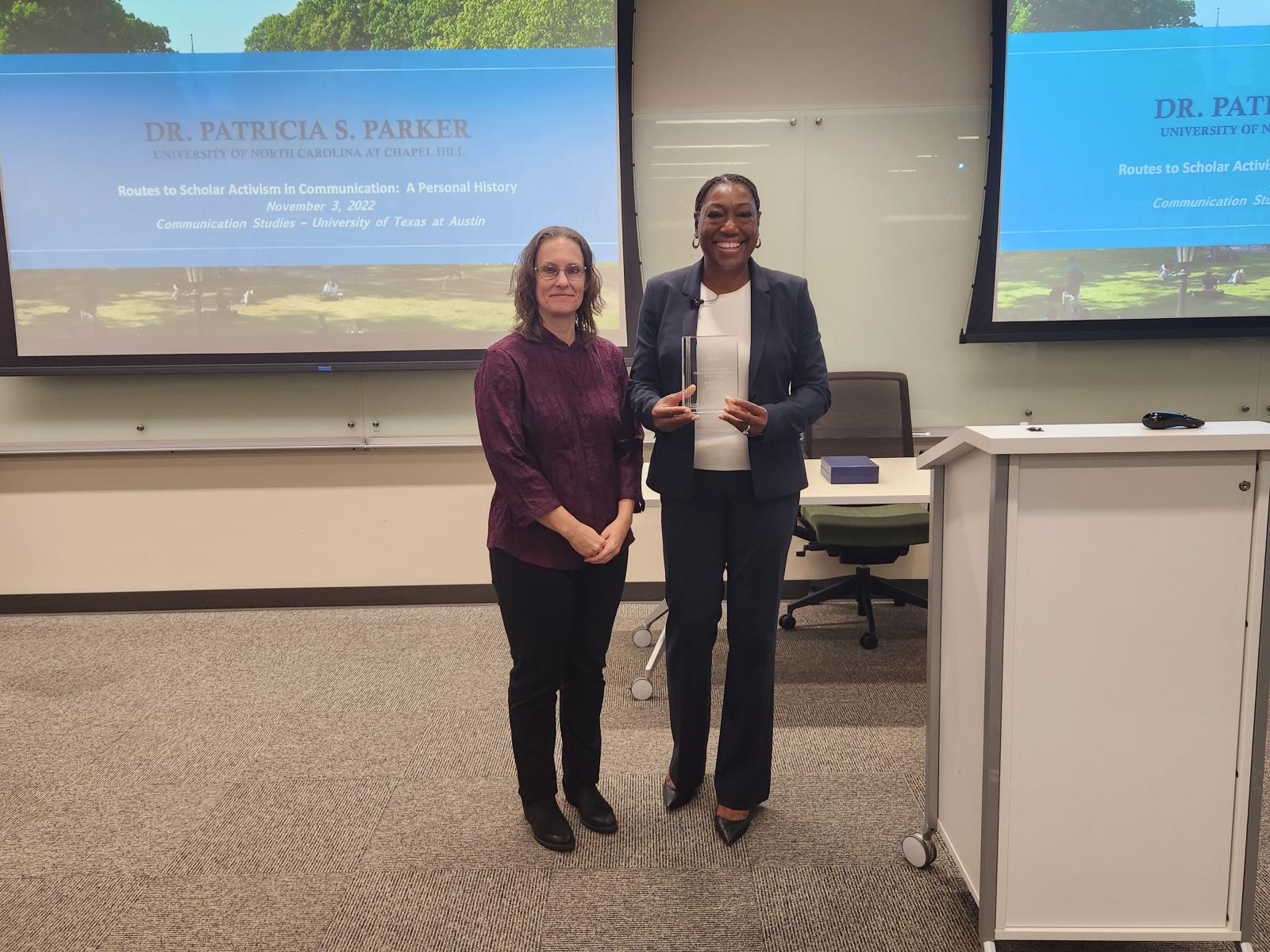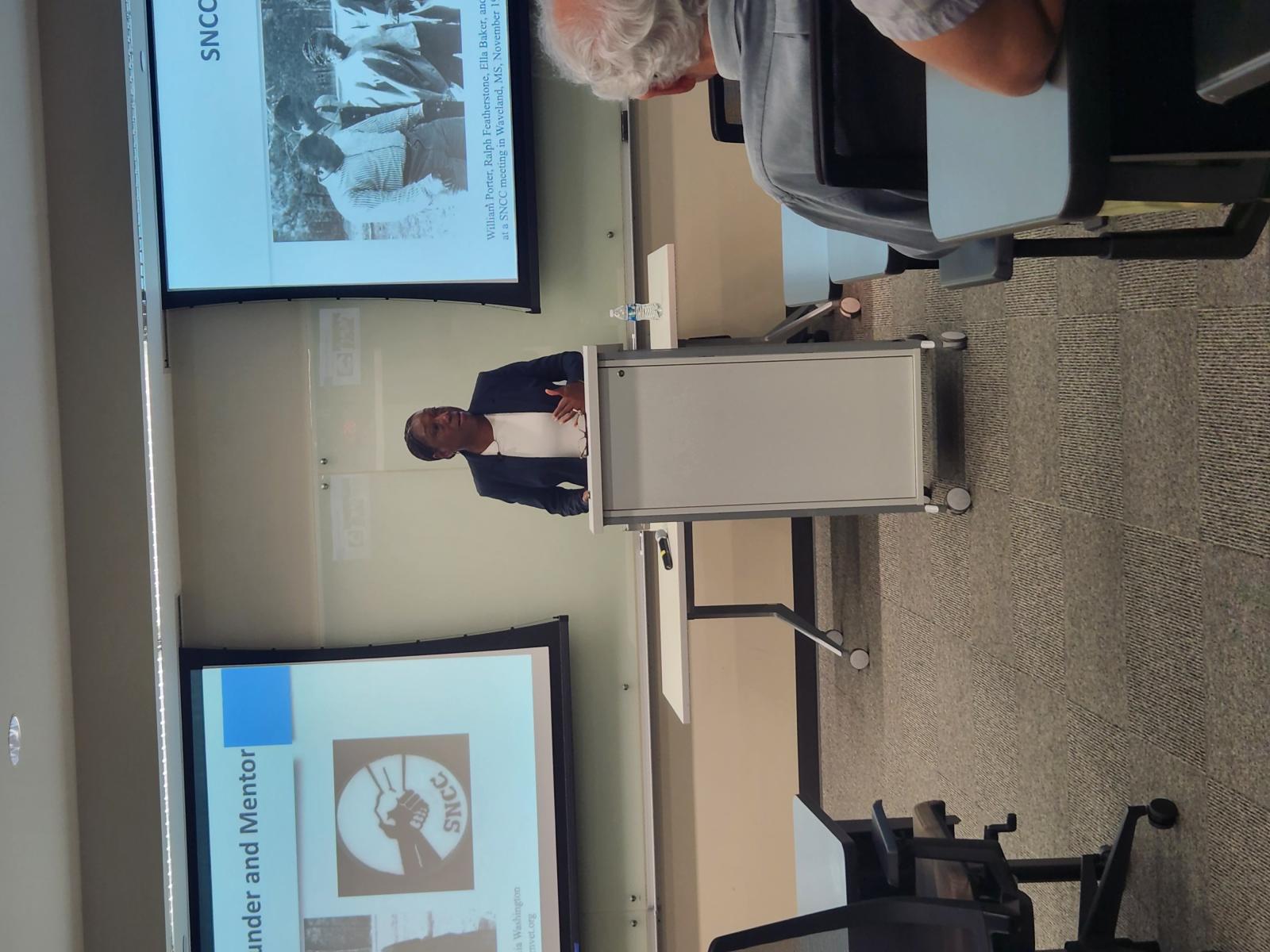Graduate Program Award
Dr. Pat Parker Accepts Graduate Program Award
Dr. Pat Parker delivered the inaugural Communication Studies Graduate Program Alumni Award Lecture as the 2022 recipient of this honor. Her talk was titled Routes to Scholar Activism in Communication: A Personal History. Parker was named this year’s winner at our annual CMS Honors Day this past May.
As part of her return to the UT campus, Parker also met with students and faculty in the Communication and Leadership program. As part of the official launch of the new Moody minor in Communicating for Philanthropy and Development, Parker shared her experiences in communication and leading positive change and her work with the Ella Baker Center for Women’s Leadership and Community Activism. The new minor, open to all students at the University of Texas at Austin, prepares students for work in development and the nonprofit world.
Dr. Parker graduated from our Ph.D. program in 1997 from what was then the Department of Speech Communication. Her advisor, Dr. Pat Witherspoon, was in attendance at the talk. Parker joined the Department of Communication at the University of North Carolina at Chapel Hill in 1998 where she quickly earned tenure and was the Chair of the department form 2015-2021. Currently, at UNC, she holds the Ruel W. Tyson Distinguished Professorship in the Humanities, and is the Director of the Institute for the Arts and Humanities. She also currently serves as the co-chair of the University Commission on History and Race.
Graduate Advisor Dr. René Dailey presented the award to Dr. Parker and introduced her to those in attendance. In those remarks, Daily said this about Parker: “Her dissertation was entitled ‘African American Women Executives within Dominant Culture Organizations: An Examination of Leadership Socialization, Communication Strategies, and Leadership Behavior.’ For this project, she interviewed African American women executives who held senior or upper-middle management positions within dominant culture organizations as well as their superiors and subordinates. She also observed the leaders in their interactions and assessed archival documents. Her findings unpacked messages that influenced these women’s’ leadership socialization and showed the significant obstacles as these women faced, such as an absence of other African American women in senior positions, negative performance attributions, and encountering organizational images and practices that excluded African American women and other people of color. They reported using a combination of avoidance and confrontation to manage these obstacles. Yet, they noted opportunities in terms of connecting with their community both in- and outside of the organization, and they led with openness, interactive leadership, empowering employees, and collaborative decision-making. “
Dailey continued: “Her dissertation is an exemplary model to follow. She delineates many relevant theories from the extant research, but also situated the study within these African American leaders’ own cultural standpoint and their intersectionality of race and gender. It is a rigorous investigation. She is meticulous in reporting detail in the methods and coding of the data. The quotes to support the themes are vivid examples of their stories and experiences. And Discussion highlights the overarching themes while noting the implications and practical applications. A truly impressive project.”
Dr. Parker has made many significant contributions to our field and beyond. She has written two books, edited several other books, authored numerous book chapters and many publications. Her research focuses on the communicative constitution of leadership, difference, and power in organizing and the potential for democratizing organizations and society. She has also mentored many graduate and undergraduate students. Her most recent book “Ella Baker’s Catalytic Leadership: A Primer on Community Engagement and Communication for Social Justice” documents the first years of her work in community-based participatory research and offers many recommendations for doing this research. Her contributions are summed up well by one of her nominators for this award: “Pat's research is trailblazing. She is not simply a high-ranking administrator (although she is that) but her work on participative praxis for social justice is a standout across the field. She also remains engaged in the [discipline] in both visible and less visible ways and is a delightful and kind human being to boot."
We congratulate Dr. Pat Parker on this honor and for all she has done as an outstanding alum of our graduate program. We also thank Dr. Josh Barbour, chair of the department awards committee, for his work related to the award selection and for making the arrangements for Parker’s return to the department.




